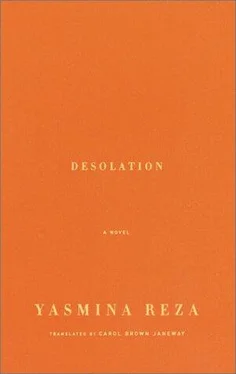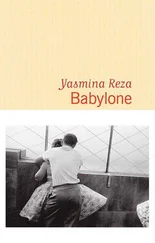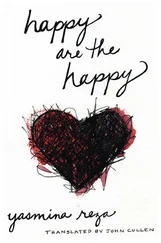If I weren’t moved by some degree of pity and affection for you, I’d find you repellent. Nancy has no idea how much you disgust me when she talks about how crushed you are. Those are her words. I’m supposed to have crushed you.
“How?” I ask.
“You were too strong, you didn’t let him blossom.”
“Ah, but he’s blossoming now?”
“Yes, he’s beginning to, it’s wonderful.”
Nancy can talk about you blossoming for minutes at a time. Your crushing and your blossoming are the two major lines on your medical chart. Not once have you ever inquired after my health. To what should I attribute this silence? Shame? Indifference, ennui? You should know I’m not well. And if you’ve always known I’ve been prone to illness, you should take on board that they now dictate the way I spend my time. But you don’t give a fuck, you don’t think it’s worth talking about. Your brother-in-law Michel who was here on Sunday with your sister and the baby — that’s when she used the word happy about you — is blossoming too, go figure. He’s joined the Jewish Ramblers at the Île-de-France. The only way he’s found to be a Jew at last. Last weekend they did Montfort-L’Amaury-Coignières. They came in the afternoon, in the morning he’d done Montfort to Coignières. Eleven miles. Over the moon. Through colonies of weekend cottages, forests sliced up by highways, the odd hill, what do I know. He’s laid back too. No vestige of existential angst. You’ll say he’s managed to weed-whack his entire psyche at one go. Explain to me how anyone, let alone in a group, can plow all the way from Montfort via Cergy to Coignières, between manure heaps and beetroot fields, ride back on the B line and remain an optimist. Here’s a boy who gets up on Sunday after a grueling walk, hops out of bed at dawn’s early light, and says to himself, Hey, great, today I’m going to walk to Coignières with my friends the Jewish Ramblers. To Coignières. Apparently one blossoms where one can. You, you need the Caribbean. Because to crown it all, in my despotism and mistreatment of you, I’ve made you a high-class whore. If you remain immune to the poetry of Cergy-to-Pontoise, it’s undoubtedly my fault and I know better than anyone, kindly note, that’s it impossible to raise the bar of unhappiness inside the Beltway.
You’ve decided to take a year’s sabbatical. You’ll be surprised to know I was curious enough to look up the word in the dictionary, and the definition makes it completely inapplicable to you because it refers to university professors going off once every seven years to do their own research. But so what, if everyone had to avoid abusing or stretching language, nobody’d ever open their mouth. So you decided to take a sabbatical year, a verbal fig leaf to disguise an entire sabbatical life, if what your friends say is to be believed. In short, you’ve decided to opt out. Fine. If there’s anything that interests me, despite myself, in this plan of yours, it’s its absolute vacuity. No irony intended, for once. When you decide to opt out of everything except touring the planet, you free yourself of all scruples and parasitic virtues, and clearly you’re miles away from any idea, thank God, of devoting your time to some form of good works, like protecting orphaned children or virgin forests. Radically egotistical, radically consistent. That’s not so common these days, particularly as someone as weak-natured as you are could be in danger of being dragged into some sort of philanthropic orgy.
One day your mother opened the newspaper and said, “Leopold Fench is dead.”
It was the worst sentence I’ve ever heard in my life.
Leo Fench was Lionel’s cousin by marriage. He had been one of the frontline troops in the heroic epic of mass manufacture in the clothing industry. I don’t know if you knew him. At the end of the fifties Leo made a fortune with the introduction of nylon thread that wouldn’t ladder. Only two weeks beforehand we bumped into each other on the rue de Solferino. He was coming from the dentist’s. No hint of the shadow of death. Pleasant, the same as always. One fine day a man is walking happily along the rue de Solferino and next day he’s dead. Leopold Fench was the most cheerful man I ever knew. When we first got to know each other in the fifties, I read this cheerfulness as a form of instability, it takes time to recognize that cheerfulness is a death song. The son of a grocer from Roanne, he made a fortune in nylon and bought himself an apartment on the rue Las-Cases. Main floor and garden, plus another floor upstairs. He had a year’s worth of work done on it, maybe even more. He redid the whole thing. He ran all round Paris to find the tiles, he ordered doors from God knows where, and mantelpieces, he went through the decorators, he designed a chandelier himself and had it made in Italy. After a year and a half he moved in with his family. One afternoon just afterward, he calls me. Come by, he says. He opens the door to me himself. We go into the salon. The room opened onto the garden, and you had to go down a few steps. It must have been January, but the weather was particularly fine that day. I tell him, “My friend, it’s a triumph.” He shows me every detail, I remember we spent whole minutes on the curtain tiebacks with their special pleating, he shows me the size of the rooms, the perspectives, the genuine boiseries, the fake cornices, he shows me everything right down to the light switches. I say, “It’s a real triumph.” I say, “There isn’t another apartment like it in Paris.” He nods. We sit down, he on a stool with tapestry work he’d been praising two minutes before. We look at the garden through the glass door. Light streams into the room. There’s an occasional noise from the street but it’s almost nothing, a vague sound that seems to emanate from the provinces, a background murmur of peaceable life.
Leo watches a leaf quiver, his finger calls my attention to the perfection of some shrub or another and he says, “Now what?”
And that’s what I think about when your mother opens the paper and says Leopold Fench is dead. Cans of tuna fish from Roanne, the stool from the rue Las-Cases, his unbuttoned jacket in the sunshine on the rue de Solferino.
A beautiful day, a man walking happily along a street in Paris at the furthest remove from death. The sky belongs to him, the river belongs to him, the houses, and the faces, belong to him, the old friend he meets where rue de Solferino and rue de l’Université cross belongs to him, as, for the last time, although he doesn’t know it, does the little chamber that is his life.
Your mother, sounding only marginally surprised, said, “Leopold Fench is dead.” The relative unimportance of the death is measured in the offhand way she says it. Your mother has suggested, if not decreed, that the world could keep on calmly turning without Leo, that Leo Fench lived and died the way dogs live and die, nice companions but not important.
“I’m shattered by this,” I say.
“Shattered? Why? The two of you weren’t that close.”
“We were close in a way that’s beyond you.”
“Everything’s beyond me these days.”
“Quite.”
She began to cry. The moment a woman starts to cry, I want to deck her. I can’t stand people who go to pieces. Take some cake, my boy. Take a slice. Orange cake, Mrs. Dacimiento brought it for my breakfast. I turned over the plastic wrapping, orange cake, twenty francs. Mass-made by lesbians from Pont l’Abbé in a former pigsty turned factory. That’s what she wants to shove down my throat at breakfast, me who hates breakfast. A piece of cellulose spritzed with artificial essence of fruit.
Leo Fench believed in life. And he opted for frivolity because he believed in life, not in people. From people, Leo expected nothing. It was he one day, when Lionel was particularly depressed and was thinking of going to a doctor, who said, “You should take something to cheer you up a little. Just a little. Just enough so that you don’t seem to be wandering loose all day in Bagneux cemetery.”
Читать дальше












